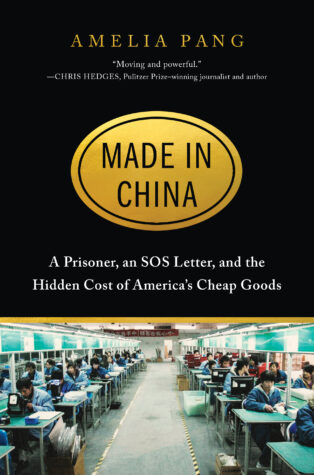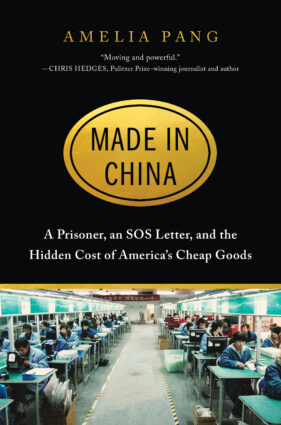
Like many of you, the last few years I’ve tried extra hard to avoid buying products made in China. It’s quite a challenge. Most websites hide the country of origin and the only way to get that information is to dig through consumer questions or call the company. After reading Made in China: A Prisoner, an SOS Letter, and the Hidden Cost of America’s Cheap Goods, I’ve become even more zealous in doing my due diligence before handing over my greenbacks.
In 2012, a woman in Oregon purchased a package of cheap foam headstones at Kmart. When she opened the box, an SOS note written in broken English fell out:
“Sir: If you occassionally buy this product, please kindly resend this letter to the World Human Right Organization. Thousands people here who are under the persicuton of the Chinese Communist Party Government will thank and remember you forever.”
The note’s author, an engineer named Sun Yi, was a Chinese political prisoner, sentenced without trial to work grueling hours at a “reeducation camp.” In Made in China, investigative journalist Amelia Pang pulls back the curtain on Sun’s story and the stories of others like him—followers of banned religions and spiritual movements, political prisoners; ethnic minorities; migrant workers; and juvenile and adult offenders who are imprisoned, tortured, and subjugated. Through extensive interviews and firsthand reporting, Pang shows us the true cost of America’s addiction to cheap goods.
“… the reasons Chinese suppliers subcontract to forced laborers lead straight to global consumers: to us and the way we buy. In our ceaseless search for the cheapest and the most current design, technology, flavor, or appliance, we reward the companies that offer the lowest prices and sell the latest trends. The most profitable retailers in every industry are the ones that meet these demands.” ~ Amelia Pang, Made in China.
Made in China is a well-researched and sobering exposé on the laogai system of forced-labor camps. Here are some disturbing things I learned:
- The equivalent of one garbage truck full of clothing arrives at a landfill every second.
- There is mounting evidence that laogai camps not only supply free manufacturing labor but also human organs for the nation’s booming transplant industry, which is estimated to be worth a billion dollars.
- According to the author, many large US retailers—including Amazon, Nordstrom, Kmart, Walmart, and Target—sell products manufactured in forced-labor camps.
- Concentration-like camps in the Xinjiang region detain approximately three million Uyghurs and Turkic Muslims.
- Global brands use the labor of workers held against their will. The author mentioned Nike, Apple, BMW, H&M, and American Girl.
The scale of the forced labor in China is massive and deeply disturbing. Made in China wasn’t an easy read, but it was an important one. Like me, you may change your shopping habits. We need to ask more questions and demand more answers from the companies we patronize. 5 stars.
Publication Date: February 2021
Genre: Nonfiction, politics and global affairs.
Read-alikes: China Shakes the World: a Titan’s Breakneck Rise and Troubled Future and the Challenge for America by James Kynge; The World Turned Upside Down: America, China, and the Struggle for Global Leadership by Clyde V. Prestowitz; The Myth of Chinese Capitalism by Dexter Roberts; Dying for an iPhone: Apple, Foxconn, and the Lives of China’s Workers by Jenny Chan; Invisible Hands by Corinne Goria.
